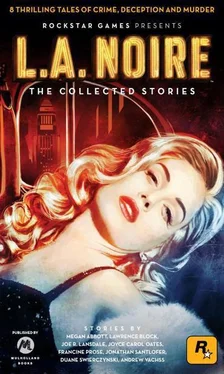I asked how he knew her. He was quiet, then pointed out something on the other side of the room. Somebody he recognized. Far as how he knew Millie, I never did get an answer.
There may have been a third time we got called there, or maybe not. Hard to keep everything straight. But then our shift changed, and we were working days, and if there were any calls to see the woman at the Olive Street address, well, we were off duty by the time they came in.
I think there must have been other calls. And looking back, I think Lew kept up with it, checked reports. He had an interest that ran deeper than mine.
A month, maybe six weeks, and we rotated back to nights. I liked nights better. You didn’t have the traffic, and it was dark, and just being in the car was better at night. The things Lew would find to talk about, and the way a conversation would just twist and turn like an old river. And the silences, too. It was all somehow better at night.
Of course, domestics were the downside of working nights. Now, you’d have husbands drinking any hour of the day, so you could in theory have a domestic disturbance on the stroke of noon, but they mostly happened in the hours right after midnight. And we weren’t back on the night shift a full week before we heard the Olive Street address coming over the radio. “Seven-forty-four South Olive, see the woman.”
You hear that? I just remembered the street number, it popped right into my head. Now, ten minutes from now I may forget my own name, but right now I remember the address.
At least I think that was it. But you know it didn’t matter when I couldn’t remember it and it doesn’t matter now. All torn down now, anyway. I can picture that little house clear as day, for all that I only saw it in the middle of the night, but in a few years when I’m gone there probably won’t be a person alive who remembers it.
That’s when something’s really gone, isn’t it? When there’s nobody left who remembers it…
Sorry, I just got distracted there. Hopped a train of thought and disappeared into the distance. That particular night, well, it was the same as the others. Maybe he was passed out that time, maybe he was belligerent or ob—what’s the word I want?
Obnoxious?
Obstreperous. Maybe he was this or that, maybe he was apologizing all over the place. Whatever it was, at bottom it was the same story. She had some new bruises and he was the one that put ‘em there. And over the next couple weeks there were two or three more calls, just variations on the theme. No, she won’t press charges. No, it’s really her fault, and he’s sorry, and they’re married, and this is something for them to work out on their own, and she’s just sorry we had to waste our time coming all that way, but we can go now, and thank you very much.
“Next time we hear that address,” Lew told me in the car, “we acknowledge it, and then we’ll go grab a hamburger someplace. Why burn gas chasing out there? Why waste our damn time?”
Then we’d get the call again, and we’d answer it, same as always.
And then one night the call came in, with the usual address. One thing different: “See the husband.”
I said, “See the husband? What did she do, beat him up?”
Lew shook his head. He knew what it meant, and by the time we got there I’d pretty much worked it out for myself.
He met us on the front step, standing out there in his underwear, and there were bloodstains on the front of his undershirt. He was bleary-eyed, and he reeked of Three Feathers. It wasn’t just on his breath. He was sweating like a pig, and the alcohol was coming out of his pores.
“I’m sorry,” he was saying. “I didn’t mean it, it was an accident, I don’t know what happened, I didn’t mean it, I’m sorry.”
Same thing, over and over and over.
Lew led him inside, and I was surprised as to how gentle his hands were this time, as if all the anger had faded away, with sadness taking its place. He put the man in an armchair, found a bottle with a little booze still in it, and gave it to him. The man took a drink, then clutched the bottle to his chest, as if to shelter it from the world.
Or to keep us from taking it away from him.
We didn’t see Millie right away, but we checked out the rest of the house, and she was in the bedroom. She was sprawled on the floor next to the bed, blood all over, and her head at an odd angle. Lew knelt down next to her, tried for a pulse, put his lips to her mouth, shook his head.
“Oh, you poor baby,” he said. “You were dying by inches and now you’re gone for real. Ah, Millie, you couldn’t listen, could you? You just couldn’t, poor baby. By God, you deserved better than what you got.”
He stood up and looked surprised to see me there. Like for a minute there it was just the two of them, and him talking to her, and no one else in their world.
To me he said, “Well, we got the fucker now, Charlie. We get to slam the barn door on him now that the horse is miles away and gone forever. If they don’t give him the gas, he’ll spend the rest of his life in a cell. The one good thing that comes out of all this is the world’s through with him.”
We were talking about that, and speculating about his chances of winding up in the gas chamber, and what difference it made one way or the other, and then there was a sound from where she was lying, and we stopped talking and turned to look at her.
And she opened her eyes. She said, “Lew?”
Her eyes closed.
And opened again. “Where’s Joe? Is Joe okay?”
Her voice was very faint, her eyes unfocused. Lew drew a breath, let it out. “Jesus,” he said. It was somewhere between a curse and a prayer. Then he said, “Charlie, go get on the phone. Call in, get an ambulance out here on the double. Go!”
So I went back to the other room, where Joe was passed out in the chair where Lew had put him. I didn’t have a number for a hospital, so I called the operator and gave her the address and told her to arrange for an ambulance.
In the bedroom, Millie looked as though she’d been crying. Tears down her cheeks, along with the blood and all. I told Lew I’d made the call, and he lowered his voice and said he didn’t know if she would make it. “She goes in and out,” he said. “You’d better wait outside so they’ll get the right house. Flag ‘em down before they fly right on by.”
I was on my way, but I stopped in the front room to look at the husband. He’d slipped off the chair and was sitting on the floor with his head on the chair cushion. I thought to myself that this piece of garbage was one lucky son of a bitch. He was sitting on a one-way ticket to Q, and then she opened her eyes and set him free.
Free to do it all over again.
The front door was open, and I’d hear the siren in plenty of time, so I stayed where I was. And I sort of heard something from the bedroom, or half heard it, and while I was trying to figure out just what it was, I heard the siren of an ambulance maybe three, four blocks away.
So I went outside and stood on the front step, and I motioned to the ambulance and pointed out where they could park, and then Lew was beside me, hanging his head.
“I think she’s gone,” he said.
Joe went to prison. There was no trial, his court-appointed lawyer had him plead it out, and that way he beat the gas chamber. The sentence was twenty to life, and Lew said that wasn’t long enough, and swore he’d turn up at the guy’s parole hearing and make sure he didn’t get out early.
Never happened. Lew and I pretty much lost track of each other. I got transferred to the Hollywood Division, but I heard about it when he killed himself. That’s not what they called it, they said he was cleaning his gun and had an accident, but it’s funny how so many cops’d have a few drinks and decide they better give their gun a good cleaning.
Читать дальше












